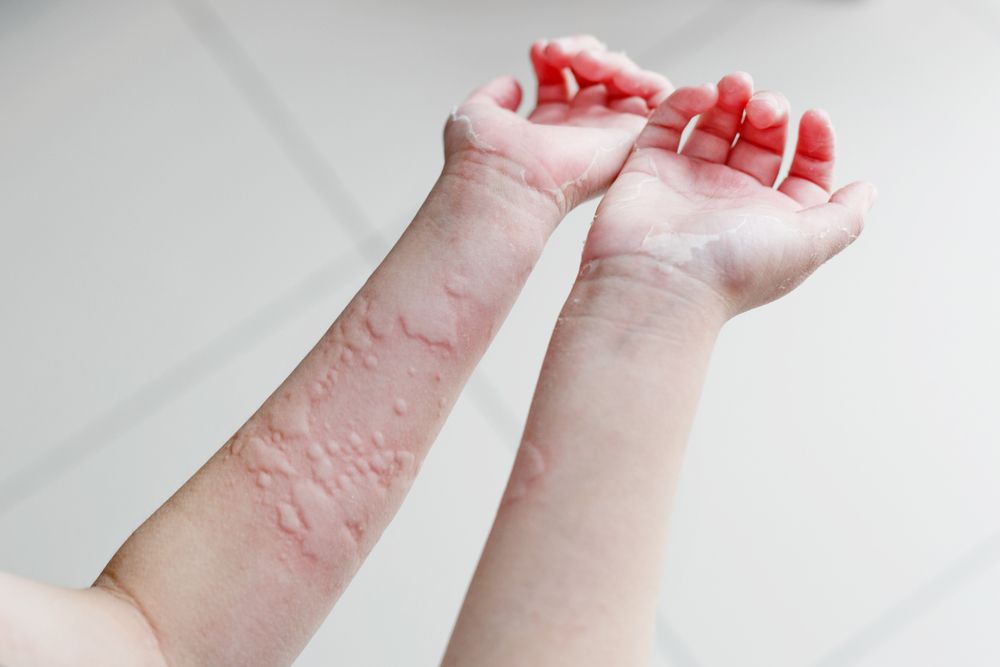- Acne
- Actinic Keratosis
- Aesthetics
- Alopecia
- Atopic Dermatitis
- Buy-and-Bill
- COVID-19
- Case-Based Roundtable
- Chronic Hand Eczema
- Drug Watch
- Eczema
- General Dermatology
- Hidradenitis Suppurativa
- Melasma
- NP and PA
- Pediatric Dermatology
- Pigmentary Disorders
- Practice Management
- Precision Medicine and Biologics
- Prurigo Nodularis
- Psoriasis
- Psoriatic Arthritis
- Rare Disease
- Rosacea
- Skin Cancer
- Vitiligo
- Wound Care
News
Article
Efficacy and Safety Data for Leukotriene Receptor Antagonists for Chronic Urticaria Presented at ACAAI
Author(s):
Late-breaking data adds important safety and efficacy data for leukotriene receptor antagonists augmentation in chronic urticaria treatment.
Adobestock

Off-label augmentation with leukotriene receptor antagonists for refractory chronic urticaria appears to be safe and effective, according to late-breaking results presented at American College of Allergy, Asthma and Immunology (ACAAI) 2023 Annual Scientific Meeting.
Daniel G. Rayner, who presented the results of the systematic review and meta-analysis on behalf of the American Academy of Allergy, Asthma & Immunology/ACAAI Joint Task Force on Practice Parameters Chronic Urticaria Guideline Development Group, noted this was the first study to appraise and synthesis evidence on leukotriene receptor antagonists in the treatment of chronic urticaria. Moreover, safety is a concern, as there is a black box warning regarding the risk of serious neuropsychiatric events.
Investigators looked at studies in databases, pharmaceutical registries, and by panel experts through March 2023. Certainty of evidence was determined using GRADE (Grading of Recommendations, Assessment, Development, and Evaluations). As part of this analysis, the researchers considered Risk of bias, inconsistency, imprecision, indirectness, publication bias, dose-response, effect size.
Of the 3364 initially screened, 33 unique randomized controlled trials were included in the meta-analysis. Of these, 1 trial investigated the leukotriene receptor antagonists zafirlukast; the remaining 32 looked at montelukast. Median study duration was 4 weeks. Most studies were of adult participants (ie, 18 years old or older), but 12 studies included children under the age of 18 years. Overall, the studies represented 3168 patients. Mean age of patients was 36 years, and 53% were women. Median Urticaria Activity Score (UAS7; 0-42) was 31.
The investigators found a high degree of evidence for most of the outcome measures. Among these findings was improvement in urticaria severity, with a mean difference in UAS7 (0–42) of -5.17 (95%CI -6.53 to -3.80). Itch numerical rating scale (NRS; 0-3) had a mean difference of -0.25 (95%CI -0.39 to -0.10), and wheal count (NRS 0-3) was -0.2 (95%CI -0.41 to -0.08).
Quality of life grade certainty of evidence was rated low by the investigators. The mean difference on the Dermatology Life Quality Index (0-30) was -4.40 ((95%CI -8.15 to -0.65). The adverse events risk ratio was 0.80 (95%CI 0.56–1.15).
The study also looked at the absolute effects of the treatment interventions. They found an absolute effect of antihistamines alone was 67 per 1000 patients; the absolute effect was 54 per 1000 patients for leukotriene receptor antagonists plus antihistamines. Overall for absolute effects, the investigators noted 13 fewer per 1000 patients (95%CI 29 fewer to 10 more). The certainty of this evidence was rated moderate.
Rayner concluded that there is a high certainty of evidence showing that augmenting antihistamines with leukotriene receptor antagonists results in improvements in urticaria severity. The investigators only had moderate certainty in terms of the safety outcomes; they noted that adding leukotriene receptor antagonists most likely had little to no impact on overall adverse events. Unfortunately, the study group could not add definitive information on the back box warnings of serious neuropsychiatric events. They concluded their research indicatedthe impact of leukotriene receptor antagonists on serious neuropsychiatric events while treating urticaria remains unclear.
Rayner et al expect these findings will stimulate discussions as well as an update for the clinical practice guidelines for chronic urticaria.
Reference
1. Rayner DG, Liu M, Cao D, et al. Leukotriene Receptor Antagonists as Add-on Therapy to Antihistamines for Urticaria: Systematic Review and Meta-Analysis of Randomized Trials. Late breaking oral abstract. Presented at: American College of Allergy, Asthma and Immunology (ACAAI) 2023 Annual Scientific Meeting; November 9-13; Anaheim, CA.
Newsletter
Like what you’re reading? Subscribe to Dermatology Times for weekly updates on therapies, innovations, and real-world practice tips.














